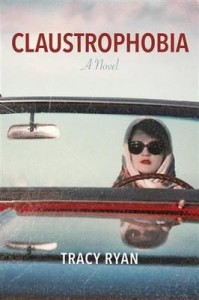lip lit: claustrophobia
Claustrophobia by Tracy Ryan leads the reader down a trail of lies, lust and obsession.
Penelope Barber, happily married, finds a decade-old letter written by her husband to his ex-lover, Kathleen Nancarrow. It convinces her that their marriage had been built on nothing but a lie and the recipient of the letter becomes the object of her obsession. Instead of finding a dangerous villain, Penelope encounters a beautiful and intelligent woman, and they tumble into an affair, built on their shared love of French literature and Scarlett Johansson.
Although caught in a world of deception Penelope finds empowerment in this new relationship. With Kathleen she can dream of things she never felt possible in her marriage: a trip to Paris, a career of her own. Regardless, she sinks into further anxiety as her deception deepens, torn between her passionate relationship and the stability of her marriage. Penelope begins to resent her husbands control.
The reader is left in suspense with every turn of the page. Will she go back to her husband or pursue this new, empowering relationship?
Ryan brilliantly transports the reader into the claustrophobic mind of Penelope through its rich description of her confused thoughts and nervous mannerisms. She fights throughout the novel to uphold social expectations and the reader quickly learns that what she says is very different to how she feels.
The most disappointing aspect of this novel is its simplistic representation of women. Firstly, Ryan perpetuates the pop-culture myth that all women hate each other; secondly she appears to condemn relationships that break traditional gender roles.
From the outset, semmsnatural that the protagonist sees other female characters as nothing more than her rivals. Her dysfunctional relationships with her mother, female colleagues and initially Kathleen are all portrayed to stand in the way of her most important relationship: her marriage.
As a reader you heave a sigh of relief when Penelope enters into a relationship with Kathleen, because she sees her not as competition but a companion (albeit beginning a coupling built on lies). The reader finally sees a genuine connection between two women that is not based on rivalry over a man, but rather mutual respect and admiration.
It all must come to an end however.
The novel concludes with Penelope’s husband, Derrick, regaining control and cleaning up the mess she has made. It reads as a cautionary tale, warning women who break away from a stable and compliant heterosexual relationship they are doomed to fail.
It could have been the web of her deception, rather than the break from social norms, that led to Penelope’s undoing. But it is more than lies and deceit that lead to the unravelling of Claustrophobia‘s protagonist: just like in horror films where the ‘slut’ character is slaughtered first, so is an uncompliant female punished for her disobedience.
Indeed, even Kathleen, a confident and intelligent woman who has deceived no one and lived comfortably with her sexuality, is also punished at the end of the novel. Although a victim to Penelope’s lies, Kathleen’s undoing results from nothing more than breaking social expectation and refusing to conform to traditional gender roles.
Derrick, Penelope’s husband, regains power and is ultimately the winner of the novel. He is rewarded for maintaining his traditional role as husband and breadwinner, and recapturing his wife. This ending undoes any story of female liberation.
Tracy Ryan’s Claustrophobia is a suspenseful page-turner. For a feminist-minded reader, however, the replaying of the ‘bitch’ stereotype, and the warning to women who break traditional gender roles, is dismaying. Not to mention unimaginative.



Hi, Annalise — thanks for the review, & I’m glad you found the book suspenseful and that it transported you into the mind of the main character.
I’m disappointed, though, that you read it as anti-feminist, because the book’s intent is quite the opposite. Not only am I consistent feminist in my life, but all my books have in some way been about my feminist views.
Claustrophobia is meant to show what happens to a frightened, neurotic woman who rejects the possibilities that liberation could offer her (one kind of liberation — there are a lot of other areas Pen could work on! She’s not meant to be a “model” protagonist…)
I need to stress, too, that I don’t “condemn relationships that break traditional gender roles” — I wholeheartedly support gay, lesbian, and trans people, as those who know me or read any of my books would know, and do not exclude myself from their number.
The novel is called Claustrophobia for a reason. Without wishing to add any spoilers, the very nature of the disturbing things that become evident about Pen’s husband by the end of the book, show that she has not won any prize — her “punishment” is in the choices she makes.
It’s not a cautionary tale saying “stay in your marriage at all costs”; it’s a cautionary tale about being too cowardly to live the life you know is possible. There is also the social/economic issue of rejecting bourgeois values and dependence on another person (male or female) to “climb” in the social world.
I would encourage you, if it appeals, to re-read the book in this light and see if it doesn’t offer more to feminists than you first thought. You could also try my earlier novels, Vamp, Jazz Tango and Sweet, which I consider to be strongly feminist books.
Best wishes,
Tracy.
PS for the above, please read “I wholeheartedly support gay, lesbian, bi and trans, and any other ‘non-normative’ descriptor you like”…